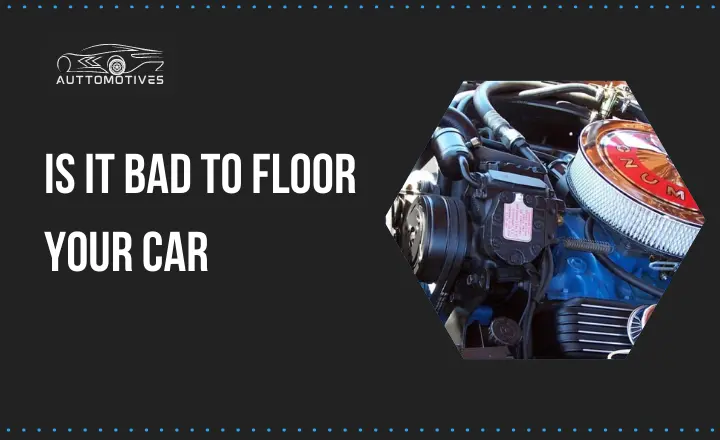Many car enthusiasts love to push their cars to the limit by flooring them. It’s exhilarating when the engine revs up, and the car accelerates rapidly. Some people argue that this practice is harmful to the vehicle and can cause damage in the long run. So, is it bad to floor your car?
We will explore the effects of flooring your car on its engine and other components. We’ll look at whether this practice increases wear and tear on parts like tires, brakes, and suspension systems or if it leads to reduced fuel efficiency over time.
Is It Bad to Floor Your Car?
Is It Bad to Floor Your Car? This is a question that many drivers ask themselves when they are behind the wheel. The answer is not a simple one as there are both pros and cons to flooring your car.
One of the biggest benefits of flooring your car is that it can give you an adrenaline rush. Pushing down on the accelerator makes you feel powerful and in control. Accelerating quickly can be helpful in certain situations, such as merging onto a highway or passing another vehicle.
There are also downsides to flooring your car. It can burn more fuel than necessary, so more money is spent on gas. Excessive acceleration can put additional strain on your engine, which could lead to costly repairs down the line. Whether or not it’s bad to floor your car depends on your driving habits and priorities.
What are the Potential Issues that Can Arise from Flooring Your Car?

Increased wear and tear
Flooring your car can be exciting, especially when trying to overtake another vehicle or speed through an empty road. This driving style can result in some potential issues that could affect the lifespan of your vehicle. One major problem with flooring your car is increased wear and tear on the engine. By pushing the engine beyond its limits, you’re putting more strain on it than it was designed to handle.
Increased wear and tear often leads to a shorter lifespan for your car’s parts and may require costly repairs. Another issue that can arise from flooring your car is decreased fuel economy. When you push the gas pedal down, your car consumes more fuel than usual as it speeds up faster. If you frequently drive like this, you’ll pay more at the pump in the long run.
Poor fuel economy
Adding weight to your car through new flooring materials can cause your vehicle to work harder and consume more fuel than it normally would. This means that even if you have a newer model with good gas mileage ratings, you could spend more on fuel simply because of the added weight.
Loss of traction
Loss of traction means less friction between your tires and the road surface. As a result, your car may start skidding or sliding uncontrollably, even on a dry surface. This puts you and other drivers at risk as it becomes challenging to maintain control over your vehicle when this happens. Flooring your car increases fuel consumption and puts unnecessary strain on the engine components leading to breakdowns if unchecked.
The issue with flooring your car is tire blowouts.
The strain on the engine
One of the most common problems that can arise from flooring your car is the strain on the engine.
When you floor your car, you essentially push it beyond its limits. This puts a lot of stress on the engine and can lead to premature wear and tear. Over time, this strain can cause significant damage to internal components such as pistons, bearings, and crankshafts. In some cases, it may even result in engine failure. For cheking more details about car engine you need to know: How to Put a Car Engine in a Boat| an Expert Guide
Legal issues
Driving over the speed limit is illegal and can result in fines or license suspension.
Another issue that may arise from flooring your car is reckless driving. This includes behaviors such as swerving between lanes, overtaking other cars dangerously, or exhibiting aggressive behavior on the road. Reckless driving is illegal and may lead to serious injury or death for other drivers and pedestrians. Legal consequences, reckless drivers may experience higher insurance premiums if they are involved in accidents due to dangerous driving habits.
Pros And Cons of Flooring Your Car:
Pros
- Improved aesthetic appeal of the car’s interior.
- Increased durability and protection against wear and tear.
- Enhanced sound insulation and noise reduction.
- Easier cleaning and maintenance compared to carpeted floors.
- Potential increase in the resale value of the car.
- Adds a unique and personalized touch to your vehicle.
- Protects the original flooring from wear and tear.
- Easier to clean and maintain than carpeted flooring
Cons
- The higher initial cost for purchasing and installing flooring materials.
- Reduced resale value if the flooring is not a standard feature or not well-suited to the car model.
- Possible difficulty in installation, particularly for non-experts who may damage other components of the car during the process.
- Limited color and design options compared to carpeting.
- Risk of slipping or sliding on wet or uneven surfaces, as non-carpeted floors can be more slippery than carpeted ones.
Conclusion:
Flooring your car can lead to potential issues that can compromise safety, performance, and fuel efficiency. It is important to consider the consequences of excessive acceleration and ensure that your vehicle is maintained properly to avoid costly repairs. It is also critical to be mindful of the environment by reducing unnecessary emissions that contribute to air pollution. While the temptation to push your vehicle to its limits may sometimes be strong, Is It Bad to Floor Your Car? It is essential to prioritize safety and responsibility on the road. Driving aggressively puts you in danger and endangers others around you. Drive responsibly and respect the rules of the road for a safer and more sustainable driving experience.
Frequently Asked Questions:
Is Flooring a Cold Engine Bad?
There is no one-size-fits-all answer to this question, as the effects of flooring on a vehicle’s performance will vary depending on the type of flooring and the severity of cold weather conditions. Some experts believe that flooring can cause significant problems for engines in cold weather, reducing airflow and obstructing engine cooling.
Is revving your engine while in the park harmful?
This question has no definitive answer, as it depends on the specific park and the time of day. Generally speaking,Revving your engine while in a park can be harmful to your health if you are not used to doing so.
Can Advancing Too Fast Harm Transmission?
This question has no definitive answer since it depends on the situation. Some experts feel that a quick advance in technology can harm transmission efficiency, particularly if the technology is uncontrolled or unplanned.

